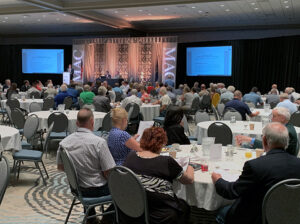Upcoming legislative work could include changes to ballot measure on wages, sick time
 This fall, the Michigan Legislature may revisit the Earned Sick Time Act in light of a recent Michigan Supreme Court ruling. The court’s decision reinstated the original 2018 ballot language for the act, which had been significantly amended by the Legislature after its adoption.
This fall, the Michigan Legislature may revisit the Earned Sick Time Act in light of a recent Michigan Supreme Court ruling. The court’s decision reinstated the original 2018 ballot language for the act, which had been significantly amended by the Legislature after its adoption.
With this ruling, legislators now have the chance to revisit and refine the act, offering clarifications and potential adjustments that could address concerns from both employers and labor organizations.
As of now, no specific bills have been introduced, but many expect that legislative proposals will emerge in the coming months. Any amendments could include updates to requirements for paid sick leave, coverage for part-time and seasonal workers, or changes in how employers manage and implement these provisions.
MAC has yet to take an official stance on the potential changes. MAC plans to review any new bill language carefully before determining to support the proposed amendments. MAC is closely monitoring developments and will engage with its membership and stakeholders to assess the impact of the forthcoming legislation.
A legal analysis of the ballot measures was obtained by MAC and notes:
“While most counties currently have wage rates that exceed these levels for their regular full-time employees, these changes could impact a number of county part-time, temporary and /or seasonal positions.
“The ESTA mandates that all employees (full-time, part-time, temporary, and seasonal) accrue sick time at a rate of 1 hour for every 30 hours worked. Employees accrue up to 72 hours (unless employer selects a higher limit) of paid sick time in a year. Employees of “small businesses” (employers with fewer than 10 employees) accrue up to 40 hours of paid sick time and 32 hours of unpaid sick time each year. In either instance, employees carry over any unused sick time from year to year. However, employees cannot use more than 72 hours (paid or unpaid) per year.”
To read the complete legal analysis, click here.
For more information on legislative work on this issue, contact Deena Bosworth at bosworth@micounties.org.
Policy platform drafts are now ready for member review in advance of Annual Conference

MAC members review and vote on policy platforms at the 2019 Annual Conference.
The draft platforms for 2024-2025 are now available on our website for your review. These platforms, which were approved by the MAC Board in early August after months of careful consideration and amendments, will guide our legislative efforts and policy positions at the state level.
NOTE: To access this webpage, you will need your county’s MAC credentials, which you can get from your county administrator’s office or by contacting MAC at melot@micounties.org or despins@micounties.org.
The platforms were developed through the diligent work of our internal committees, who reviewed the platforms from previous years and made necessary amendments to reflect current needs and priorities. Our internal committees ― Health and Human Services, Judiciary and Public Safety, Transportation and Infrastructure, Finance and General Government, Environmental and Regulatory Affairs and Agriculture and Tourism ― have played a crucial role in shaping these documents.
These platforms are critical in helping MAC staff respond to legislative developments and advocate for the interests of counties across Michigan.
Amendment process
MAC’s By-laws (Article III) state:
“Section 6 Platform. A member wishing to submit an amendment to the MAC Platform shall submit the amendment to MAC at least five (5) days prior to the opening day of the MAC Annual Conference. Such amendment will require a majority vote at the annual meeting to be adopted.
“An amendment to the MAC Platform may be presented from the floor during the annual meeting. Such amendment will require a 2/3 majority vote of the members at the meeting at which a quorum is initially established to be adopted.”
To meet the submission deadline, the text of an amendment must be sent to despins@micounties.org by 5 p.m. on Sept. 17.
The final vote on the platforms will take place during our Annual Business Meeting on Thursday, Sept. 26. Your participation in this process is essential, and we look forward to your input and involvement.
For more information, contact Governmental Affairs Director Deena Bosworth at bosworth@micounties.org.
Podcast 83: State Capitol remains a quiet place, policy-wise
 Legislative activity remains minimal in Lansing, but MAC is monitoring several situations that loom for the end of 2024, members of the Podcast 83 team discussed in their newest episode.
Legislative activity remains minimal in Lansing, but MAC is monitoring several situations that loom for the end of 2024, members of the Podcast 83 team discussed in their newest episode.
On the revenue sharing front, MAC and its members are waiting on final calculations from the state Treasury Department to have final and firm fiscal 2025 investments.
“The way the budget ended up was that every county is going to get the same amount they got for this current fiscal year, plus an increase,” said Deena Bosworth. “Now the base is what you got in fiscal 2024, plus a $30 million increase …
“All of you who are out there thinking, ‘Well, what does that $30 million mean to my particular county?’ An estimate is on our website. … And I want to stress they are preliminary numbers. … As soon as the Michigan Department of Treasury can figure out what the taxable value is for 2024 for your particular county, they will go back and redo those numbers. We don’t expect them to change very much. So, what we have on our website is pretty darn close …”
MAC also is hard at work on trial court funding via a new workgroup.
“The trial court funding extension was pushed back to Dec. 31, 2026,” noted Samantha Gibson. “The goal is, in the meantime, for the State Court Administrative Office and the Michigan Judicial Council to work on new recommendations for reform. Right now, there is a clerical workload study going on. … I and two of our board members, Melissa Daub and Ken Mitchell, serve on that group. We were tasked with coming up with a survey that’s going out to local court staff clerks, traffic, criminal, probate, you name it. They’ll be doing a workload study, filling out that survey. And then once those survey results are reported, then recommendations can move along in that process.”
Finally, new language is out from advocates who want to impose a statewide septic code.
“It’s substantially different,” said Madeline Fata, in reference to the new language over previous drafts. “We are still taking a look at it, still trying to analyze what the practical implementation of it means … Hopefully, by the (Annual) Conference, we’ll be able to speak to it a little better. So those of you attending the conference will be able to get a little more information.”
View the full episode, recorded on Sept. 9, by clicking here.
Previous episodes can be seen at MAC’s YouTube Channel.
And you always can find details about Podcast 83 on the MAC website.
MAC extends its Opioid Settlement Technical Assistance Program
 MAC is excited to announce the continuation of its no-cost technical assistance to counties on opioid settlement funds.
MAC is excited to announce the continuation of its no-cost technical assistance to counties on opioid settlement funds.
MAC has been awarded funds from Bloomberg Philanthropies to continue the technical adviser – opioid settlement funds planning and capacity building position through the end of June 2025. We strongly encourage counties to begin or continue work with our technical adviser and utilize the Opioid Settlement Resource Center tools and templates.
Over the last two years, the technical adviser has responded to 296 technical assistance requests, engaged 72 counties, conducted 78 presentations, completed 31 media interviews and created 46 work products. We look forward to our continued work in the opioid settlement space.
For more information, contact Amy Dolinky at dolinky@micounties.org.
 |
 |
 |
MAC on the Road
MAC’s Gabriel Zawadzki crisscrossed the state recently to do Christmas in August, delivering MAC’s 125th Anniversary gifts to members that had not received them, including (l-r) Montmorency (Administrator Aprille Williamson); Barry (retiring Administrator Michael Brown) and Tuscola (Administrator Neil Hammerbacher).
Climate and health adaptation planning technical assistance is now available to Michigan communities
 The Michigan Department of Health and Human Services (MDHHS) invites applications for the Climate and Health Adaptation Planning technical assistance opportunity. This initiative is designed to empower two Michigan communities to effectively address and mitigate local health-related climate concerns by engaging in a graphic visioning process that provides communities with a consensus vision, planning recommendations, and a set of before/after images to guide adaptations that address climate impacts on public health.
The Michigan Department of Health and Human Services (MDHHS) invites applications for the Climate and Health Adaptation Planning technical assistance opportunity. This initiative is designed to empower two Michigan communities to effectively address and mitigate local health-related climate concerns by engaging in a graphic visioning process that provides communities with a consensus vision, planning recommendations, and a set of before/after images to guide adaptations that address climate impacts on public health.
The MDHHS Michigan Climate and Health Adaptation Program (MICHAP), Michigan State University (MSU) School of Planning, Design and Construction (SPDC) and MSU Extension have partnered since 2017 to advance climate and health adaptation statewide. The Climate and Health Adaptation Planning technical assistance opportunity seeks projects that integrate planning and design elements within a climate and health adaptation framework. Eligible projects must directly address specific climate-related challenges, such as rising temperatures, flooding, drought, poor air quality, vector-borne infection, and other climate-related hazards, while also focusing on health and vulnerable populations.
Examples could include improved landscape management or physical design interventions, including innovative green infrastructure techniques, that enhance the resilience of downtown streetscapes, parks, bikeways and trails, open space systems, parking lots, neighborhoods or industrial/commercial areas, while simultaneously addressing a locally identified climate-health concern. All projects must focus on a specific site location, which can vary from a single parcel to a subarea.
Michigan cities, villages, townships, counties and tribal nations are eligible to apply. Interested communities must complete an application by Nov. 1, 2024, at 11:59 p.m.
Staf f picks
f picks
- How the diploma divide transformed American politics (Niskanen Center)
- How we should spend the opioid settlement funds (Counterpunch.org)
- Planning for a daunting new normal of flood risk (Governing)
- Genetically modified pigs might save your life (Popular Mechanics)
